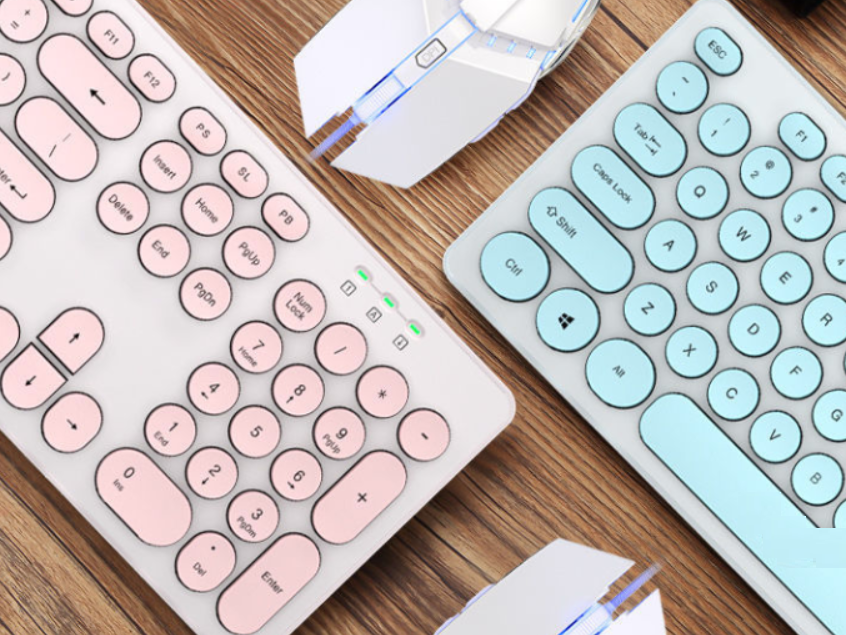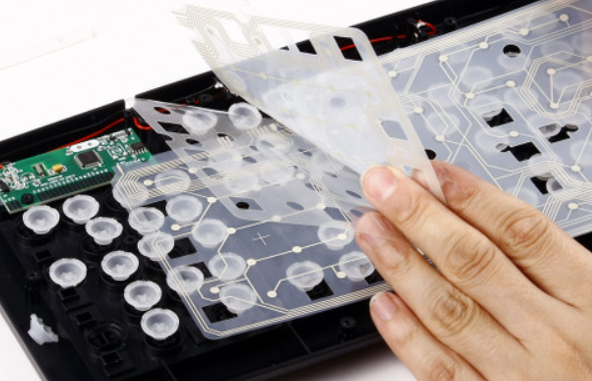
Mechanical vs. Membrane Keyboard for Gaming: Which is Best One?
Mechanical vs. Membrane Keyboard for Gaming: Which is Best One?
When it comes to gaming, your keyboard is more than just a tool. It’s an integral part of the experience, directly affecting performance, comfort, and even enjoyment. Two of the most common types are mechanical and membrane keyboards, each with unique features that cater to different users. Deciding which is best depends on your gaming habits and preferences. Let’s dive deeper into what sets these two types apart to help you make an informed decision.
What Is a Mechanical Keyboard?
A mechanical keyboard stands out due to its use of physical switches beneath each key. Unlike membrane keyboards that rely on a thin layer of conductive material, mechanical keyboards feature individual switches. These switches trigger a signal when pressed, offering a tactile response or audible click, depending on the type of switch used.
Mechanical keyboards have been around for decades and are favored in gaming and professional environments for their durability and precision. They’ve become a staple for those who value reliability and customization.

What Is a Membrane Keyboard?
A membrane keyboard, on the other hand, uses a different mechanism. Beneath the keys lies a thin membrane layer that presses down onto a circuit board when a key is pressed. This action sends the signal to the computer.
Membrane keyboards are the most common type of keyboard due to their affordability and simplicity. They are lightweight, quiet, and often slim, making them a popular choice for casual users and office environments.
Mechanical Keyboard vs. Membrane Keyboard
1. Feel and Use Experience
Mechanical Keyboard
- Strong, solid feel with clear tactile feedback.
- Green switch: Produces a distinct “click” sound and has a pronounced tactile bump, ideal for gamers and heavy typists who prefer robust feedback.
- Red switch: Lightweight and smooth, suitable for prolonged use with minimal fatigue.
Membrane Keyboard
- Light and soft feel with no noticeable tactile bump.
- Comfortable for extended typing sessions as it reduces finger fatigue.
- Fast key response with touch-based feedback, suitable for scenarios requiring rapid input.

2. Durability and Maintenance
Mechanical Keyboard
- High durability due to individual mechanical switches for each key.
- Average lifespan exceeds 50 million key presses.
- Regular cleaning is essential, as dirt can accumulate inside.
- Maintenance is more complex compared to membrane keyboards.
Membrane Keyboard
- Shorter lifespan, typically around 5 million key presses.
- Durability may decline over time, leading to reduced key responsiveness or failure.
- Easier to clean due to splash-proof designs, requiring less maintenance.
3. Durability and Maintenance
Mechanical Keyboard
- Higher cost, ranging from several hundred to thousands of yuan.
- Highly customizable: users can change keycaps, modify layouts, and choose different switch types.
- Ideal for those who value personalization and unique settings.
Membrane Keyboard
- More affordable, usually between tens to hundreds of yuan.
- Limited customization options, typically only allowing keycap replacements.
- Offers great value for cost-conscious users.
Is Mechanical Better or Membrane?
The debate between mechanical and membrane keyboards is subjective and depends on what the user values most. Mechanical keyboards often emerge as the favorite for gamers due to their robust build, tactile feedback, and variety of switch options. These features enhance precision and responsiveness, making them particularly suitable for competitive gaming and high-performance environments. Their customization capabilities also appeal to users who want a keyboard tailored to their preferences.
Membrane keyboards, however, have their strengths. They are quieter, more affordable, and lightweight, which can make them more appealing for casual users or those who need portability. If you’re someone who occasionally games and primarily uses a keyboard for typing or everyday tasks, the benefits of a mechanical keyboard might not justify its cost.
So, which is better? If you’re a serious gamer, mechanical keyboards are likely worth the investment. For more general use, a membrane keyboard might suffice. Ultimately, the decision should align with your priorities and how much you’re willing to spend.
Do Mechanical Keyboards Really Make a Difference for Gaming?
Yes, mechanical keyboards can significantly impact gaming performance. Their tactile feedback ensures that every keypress is registered, reducing the chances of missed inputs during intense gameplay. The wide range of switches available also allows gamers to choose one that best fits their style. For instance, linear switches are great for rapid key presses, while tactile or clicky switches provide better feedback for deliberate actions.
Mechanical keyboards also tend to feature anti-ghosting and N-key rollover, both of which are critical for gaming. Anti-ghosting ensures that simultaneous key presses are accurately detected, while N-key rollover allows all keys to register, even when pressed at once. These features are especially important in games that require complex key combinations.
Why Do Some People Prefer Membrane Keyboards?
Despite the popularity of mechanical keyboards, membrane keyboards remain a favorite for certain users due to their specific advantages. One of the main reasons is their affordability. Membrane keyboards are cost-effective and widely available, making them an excellent choice for those who need a budget-friendly option.
Another reason is their quiet operation. Membrane keyboards produce minimal noise, which makes them ideal for shared spaces, offices, or late-night gaming sessions. Their slim and lightweight design also appeals to users who value portability and a sleek aesthetic.
Some users find the soft, less tactile feedback of membrane keyboards more comfortable for extended use. The gentler actuation force required to press the keys can reduce finger fatigue, especially for those who type or game for long periods. While they may not offer the same level of precision as mechanical keyboards, these qualities make membrane keyboards a practical choice for many.
What Is the Lifespan of a Membrane Keyboard?
The lifespan of a membrane keyboard is generally shorter than that of a mechanical keyboard. On average, membrane keyboards are rated for around 5 million key presses per key. For moderate users, this can translate to 1-3 years of reliable performance. However, heavy use or poor maintenance can significantly reduce this lifespan.
Compared to mechanical keyboards, which often last 50 million key presses or more, membrane keyboards may seem less durable. However, for users who don’t demand intense daily use, their lifespan is often sufficient. Proper care, such as keeping the keyboard clean and avoiding excessive force on the keys, can help prolong its usability.

What Will Affect the Lifespan of a Membrane Keyboard?
Several factors can influence how long a membrane keyboard lasts:
1. Intensity of Use
Frequent typing or gaming can wear out the membrane layer faster. Gamers who press keys with force or use their keyboards for extended hours may notice a shorter lifespan.
2. Environmental Factors
Exposure to dust, spills, or humidity can damage the membrane layer. Using the keyboard in a clean and dry environment helps prevent such damage.
3. Maintenance and Cleaning
Regular cleaning can prevent dirt and debris from accumulating under the keys. Dust or crumbs can affect keypress accuracy and wear out the membrane over time.
4. Build Quality
Some membrane keyboards are made with better materials than others. Higher-quality keyboards might last longer, even with heavy use.
5. Quality of Membrane Switch/Panels
The quality of the membrane switch itself plays a crucial role in determining the lifespan of the keyboard. Low-grade switches may wear out quickly, leading to unresponsive keys or inconsistent performance. High-quality membrane switches are designed to offer smoother operation and better resistance to wear. Investing in a keyboard with superior membrane switches can ensure more reliable performance over time.
Yu An electronics has worked in membrane switches with years experiences, we have professional engineer experts to give you a perfect solution. During these years, we have manufactured numerous of membrane oanels for our customers. If you want to know more, welcome to contact us right now!

Know the Difference between Tactile and Non-Tactile Membrane Switching
When selecting the appropriate interface for a product, it can be wise to understand the differences between tactile and non-tactile membrane switches so that the engineer and the purchaser make a better decision. They are both very common in medical equipment, domestic appliances, and industrial equipment, though they do not present the same user experience. ...

Step-by-Step Guide to Selecting the Right Membrane Switch for Your Product
It is not easy to choose the appropriate interface for an electronic device with the number of various types of membrane switches. This is a basic, stepwise analysis to help product designers and manufacturers select the optimal choice. Step 1: Determine your Application Requirements Begin by making a list of locations where switches are used, ...

Top Membrane Switches for Home Electronics Projects in 2025
You can elevate your home electronic membrane switch project in 2025 with standout models such as the 4×4 Matrix 12 Keys Keypad from SOUSHINE, the rgb-enabled strip switches from Molex, and custom graphic switches by Panasonic. These switches offer slim profiles and reliable performance, making them easy to integrate into your DIY setup. You gain ...
Contact us online